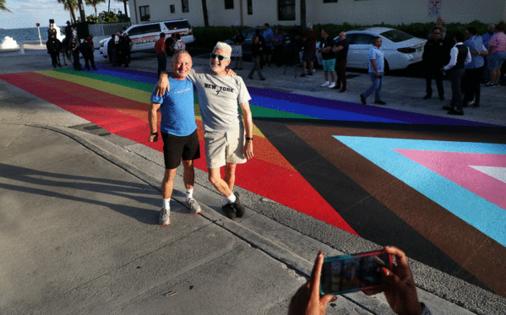State orders Fort Lauderdale to remove LGBTQ+ rainbow street markings -- plus three others
Published in News & Features
FORT LAUDERDALE, Fla. — The state has ordered Fort Lauderdale to remove the section of a street near the beach painted in the colors of the LGBTQ+ progress pride flag, as it moves beyond its efforts to eradicate rainbow crosswalks throughout Florida.
A letter dated Thursday and received by the city late in the day orders removal of the pavement markings on Sebastian Street between State Road A1A and Seabreeze Boulevard. The location is near what is widely known as the unofficial LGBTQ+ section of Fort Lauderdale beach.
The campaign against rainbow street markings emanates from President Donald Trump’s and Gov. Ron DeSantis’ transportation secretaries.
DeSantis commented Thursday on social media. Responding to criticism over removal of the rainbow crosswalk at the site of the former Pulse nightclub in Orlando, where a gunman killed 49 people and wounded 53 at the LGBTQ club’s Latin night, DeSantis said, “We will not allow our state roads to be commandeered for political purposes.”
Fort Lauderdale Mayor Dean Trantalis had previously said he hoped it could survive since it “is not a crosswalk and is not a traveled street,” which he said put it in a gray zone. Trantalis couldn’t immediately be reached for comment Friday morning.
City Commissioner Steve Glassman said via text: “The state’s actions are shameful. This is an entirely new level of state intrusion into local municipal sovereignty and it is unacceptable. Fort Lauderdale will not tolerate the hatred and discrimination against our LGBTQ+ residents and visitors — just as we would not tolerate the marginalization of any in our welcoming city.”
Unlike many of the Department of Transportation’s previous letters to cities around the state involved locations that had LGBTQ+ rainbow crosswalks — and even though DeSantis and top transportation officials have concentrated on markings they regard as political — the order to Fort Lauderdale was broader.
It cited the rainbow painted street and three intersections where streets have been painted with various designs. Steve Braun, the regional transportation secretary for the district that includes Broward County, was unequivocal. He told Fort Lauderdale City Manager Rickelle Williams that state law “requires removal of these pavement markings immediately.”
Besides Sebastian Street, what Braun called his “initial list” of “noncompliant locations” includes the intersections of Breakers Avenue and Riomar Street, Breakers Avenue and Terramar Street and East Las Olas Boulevard and Almond Avenue.
At Breakers and Riomar the center of the intersection is painted in a large blue wave pattern. Images online show the crosswalks have large blue, pink and orange polka dots. Breakers and Terramar has a similar wave pattern in the center, but the crosswalks have squares of color.
All four locations are in Glassman’s City Commission district.
Braun said he was writing to Williams because “many local jurisdictions” have been removing markings the state deems unacceptable, but “We have not heard from the City of Fort Lauderdale regarding whether you intend to comply.”
He told her the city must contact the state agency by Sept. 4 “and let us know if you intend to comply. If we do not hear from you, the pavement markings referenced above will be removed by the Department of Transportation without further notice.” If that happens, the state will bill the city for the cost.
It also contained a threat to force the city’s hand: withholding of state funds if the city doesn’t comply.
As with other cities, Braun told Fort Lauderdale that it could request an administrative hearing, but the letter suggested it wouldn’t produce a different outcome. “The Department has already reviewed the pavement markings at the location(s) mentioned above and determined that the pavement markings will not be allowed,” he wrote.
Fort Lauderdale’s rainbow street is already in disrepair after being damaged by a nearby construction project.
Documents previously released in response to a public records request from the South Florida Sun Sentinel show city officials had been debating the legalities of the street and whether they should tell the developer to restore everything, including the flag or restore the street with no flag.
The transportation policy comes at a time of a rapidly shifting political environment surrounding the LGBTQ+ community and related issues. Efforts that support diversity, equity and inclusion have been disbanded by federal and state governments.
That has even extended to the annual commemoration of the Pulse nightclub massacre. After years of including LGBTQ and Hispanic communities in the official state description of Pulse Remembrance Day, DeSantis omitted both this year.
On July 1, President Donald Trump’s transportation secretary, Sean Duffy, decreed that pride intersections don’t belong on public roads. Writing on social media, Duffy said that “Taxpayers expect their dollars to fund safe streets, not rainbow crosswalks.”
The next day, DeSantis’ transportation secretary, Jared Perdue, endorsed Duffy’s statement. Writing on social media, Perdue said Florida wants to “keep our transportation facilities free & clear of political ideologies.”
Some cities, including Boynton Beach and West Palm Beach, quickly said they would remove their rainbow crosswalks.
Others — including Delray Beach, Key West, Miami Beach and Orlando — haven’t moved quickly or at all, and the state has ordered or implemented removal of their rainbow crosswalks.
---------------
©2025 South Florida Sun Sentinel. Visit at sun-sentinel.com. Distributed by Tribune Content Agency, LLC.







Comments